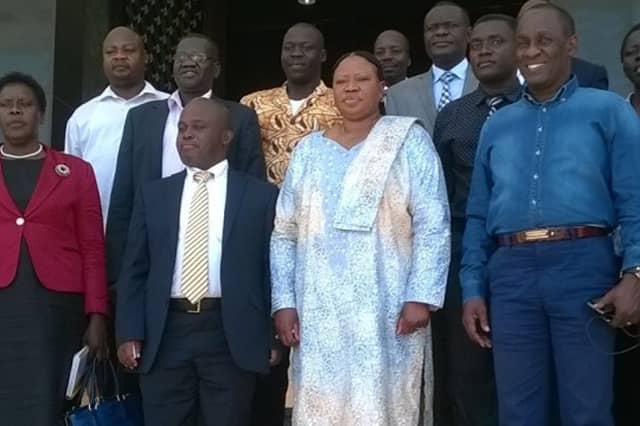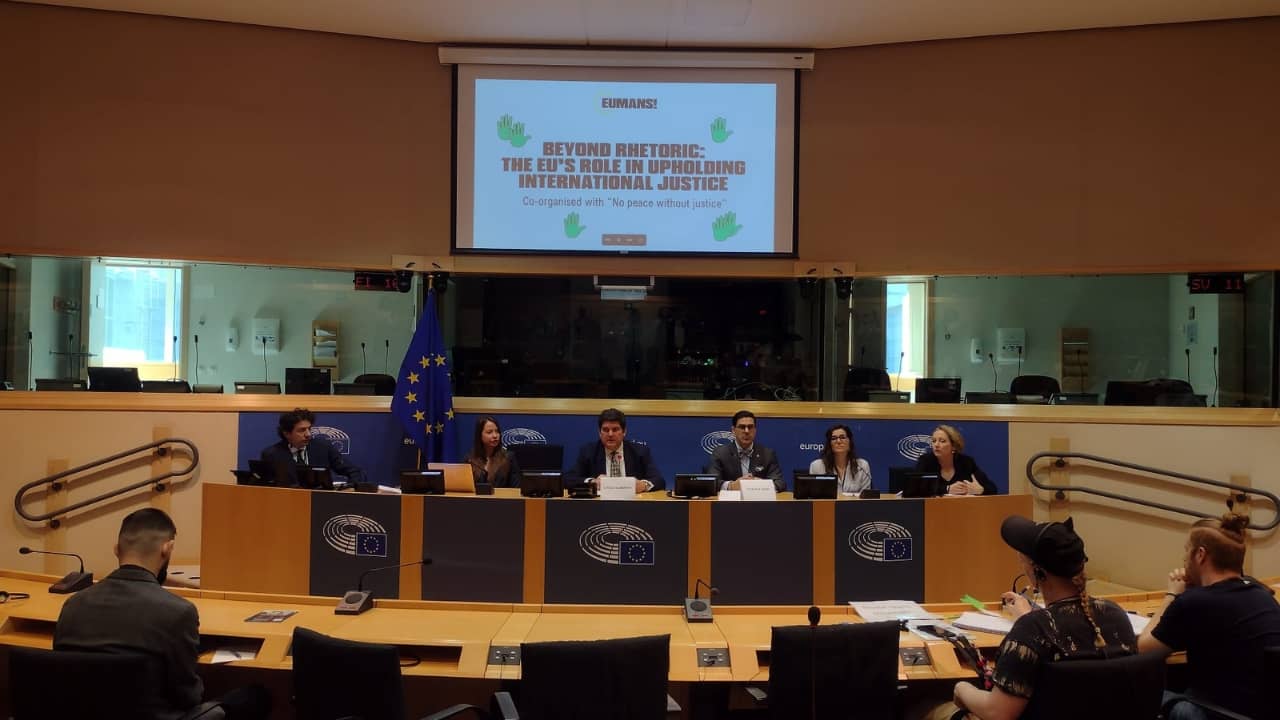
The Hague/New York, 27 February, 2015: Members of the Ugandan National Group of Parliamentarians for Global Action (PGA), under the leadership of the Chair of the PGA National Group Hon. Stephen Tashobya, MP, Chair of the Legal and Parliamentary Affairs Committee of the Parliament of Uganda and Board Member of PGA, met with the Prosecutor of the ICC during her first official visit to the country in this position.
The purpose of this visit of the Prosecutor was to meet with affected communities and victims of the conflict in Northern Uganda, which are also represented in Parliament by Legislators – including PGA Members –, and to hold discussions concerning how to bring the long-awaited justice to the victims of alleged mass-atrocity crimes perpetrated by LRA leaders indicted since 2005 before the ICC. A multi-party group of MPs, convened by the PGA Uganda National Group, had a chance to hear from the Prosecutor about the most recent developments at the Court, such as the arrest and transfer of Mr. Ongwen to the Court, his first appearance before the Pre-Trial Chamber and the next steps of the case. Prosecutor Bensouda affirmed that “Mr. Ongwen will be treated with dignity throughout the proceedings at the Court and subjected to a fair and impartial judicial process of the highest international standards that will fully respect all his rights as a defendant. A panel of three independent judges will listen to all sides and assess all evidence and submissions before taking any decision”.
The debate then turned to the Amnesty Act 2000, which was the object of vibrant discussions among MPs and the Prosecutor. Hon. Tashobya brought to people’s attention the official statement of January 2015 through which the President of Uganda agreed with the standpoint of PGA, namely that the Amnesty Act 2000 cannot cover crimes against humanity, which are crimes under international law and not crimes under national law that could fall under the amnesty-authority of the Head of the Executive branch of Government.
The importance of domestic prosecutions was also a central part of the discussions, in line with the principle of complementarity, which is an essential building-block to fight impunity within the Rome Statute system. MPs and the Prosecutor agreed that the ratification of the Rome Statute was only the first step and that it is of outmost importance to implement the provisions of the Rome Statute in the domestic legislation of Uganda. It is for this reason that PGA Members are working relentlessly for the effective application of the ICC Act that was unanimously adopted by Parliament on 10 March 2010 and was enacted into law on 25 May 2010, in no small measure thanks to the efforts made by PGA Members in Uganda since 2004.
Uganda and the African Great Lakes region needs to move on with effective application of the law implementing the Rome Statute. It is our obligation to provide access to justice, and reparations and redress to the direct and indirect victims of international crimes, especially those from Northern Uganda, since this is their right in the legislation that we have adopted and not a favor afforded to them. The Transitional Justice policy is the main tool that the Government of Uganda has put together to address this imperative of effective application of our ICC Act of 2010 and other commitments to the victims: Now the time has come for effective application and full implementation of the policy and its principles.Statement by Hon. Tashobya, Chair of the Legal and Parliamentary Affairs Committee, Board Member of PGA and Chair of the PGA Uganda National Group
We are pleased to see that Prosecutor visited Uganda to gather more evidence on the Ongwen case, visited the affected communities and met with sixteen PGA Members from affected regions (Northern/Eastern Uganda) and other Members of the PGA National Group. We will do everything in our power to help in efforts to collect more evidence for the Ongwen case and to ensure effective cooperation with the ICC. We would like to express our strong support that that people in and outside power must be held to accountable for wrongs and atrocities they commit against humanity.Statement by Hon. Abdu Katuntu, Shadow Attorney General, Vice-Chair of the PGA Uganda National Group
We note that when Dominic Ongwen was indicted in 2005, his indictment stipulated only four charges; murder, inhuman and cruel treatment, intentionally directing an attack against civilian population and pillaging. We respectfully encourage Madam Prosecutor to expand the scope of the crimes to sexual and gender based crimes like rape, sexual slavery, forced pregnancy, and enforced prostitution and the jurisdiction to crimes committed in the DRC, Central African Republic and South Sudan.Statement by Hon. Betty Amongi, MP, Member PGA and Chairperson, Uganda Women Parliamentary Caucus
From 2012 to 2014, PGA carried out a project to support domestic prosecutions in compliance with the principle of complementarity in Uganda and the DRC with the pivotal support of the John D. and Catherine T. MacArthur Foundation. Read more about the Principle of Complementarity.
PGA Members have contributed to 76 of the 123 ratifications of, or accession to the Rome Statute to date. PGA is a member of the Steering Committee of the Coalition for the ICC.
The PGA Campaign for the Universality and Effectiveness of the Rome Statute system receives support from: The European Union (European Instrument for Democracy and Human Rights), The Governments of the Netherlands, Switzerland, Estonia, Liechtenstein and Humanity United. PGA receives core support from the Governments of Sweden and Denmark.




